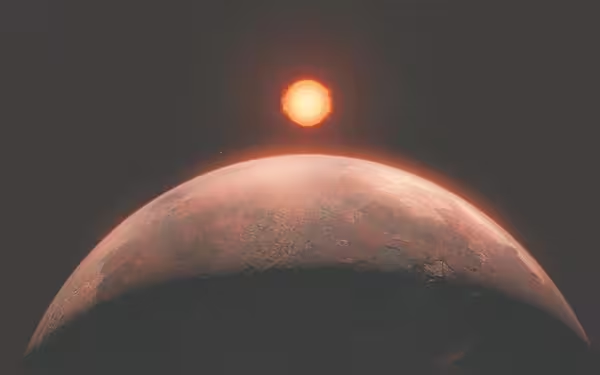Saturday, November 16, 2024 05:31 PM
Rare Exoplanet Barnard B Discovered Near Earth
- Exoplanet Barnard b is smaller than Earth.
- It orbits Barnard’s Star, six light years away.
- Surface temperature reaches 125 degrees Celsius.
 Image Credits: dawn
Image Credits: dawnScientists discover Barnard b, a rare exoplanet smaller than Earth, orbiting Barnard’s Star, with extreme temperatures making it inhospitable.
In a remarkable discovery that has captured the attention of astronomers and space enthusiasts alike, scientists have identified a rare exoplanet smaller than Earth. This intriguing planet orbits Barnard’s Star, one of the closest stars to our Sun, located a mere six light years away. The findings were made possible through extensive observations conducted over five years using the Very Large Telescope situated in the Chilean desert.
The search for exoplanets, or planets outside our Solar System, often focuses on those located in the "Goldilocks zone." This is the region around a star where conditions are just right for liquid water to exist—neither too hot nor too cold. Unfortunately, the newly discovered exoplanet, named Barnard b, does not fall within this habitable zone. In fact, it is positioned 20 times closer to its red dwarf star than Mercury is to our Sun, resulting in extreme surface temperatures.
According to a recent study, a year on Barnard b lasts only three Earth days, and its surface temperature reaches a scorching 125 degrees Celsius (257 degrees Fahrenheit). This intense heat makes it impossible for liquid water to exist on the planet's surface, a crucial factor for the potential of extraterrestrial life. Jonay Gonzalez Hernandez, a researcher from Spain’s Instituto de Astrofisica de Canarias, emphasized the significance of this discovery, stating, "Barnard b is one of the lowest-mass exoplanets known and one of the few known with a mass less than that of Earth." He further noted that even though Barnard’s Star is about 2,500 degrees Celsius cooler than our Sun, the conditions on Barnard b remain inhospitable.
Barnard’s Star is located in the constellation Ophiuchus and is a prime target for exoplanet hunters due to its status as a red dwarf star. Red dwarfs are known for being significantly cooler than other types of stars, which makes them interesting candidates for the search for life beyond our planet.
This discovery not only adds to our understanding of the universe but also highlights the ongoing quest to find planets that could potentially support life. While Barnard b may not be a candidate for habitation, it serves as a reminder of the vastness of space and the many mysteries that remain to be uncovered. As technology advances and our exploration of the cosmos continues, who knows what other fascinating worlds await us in the depths of the universe?













